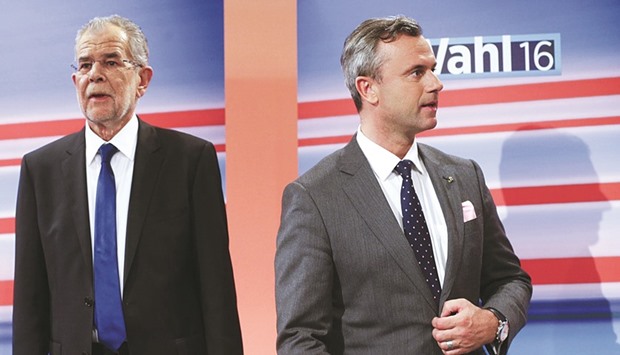The two candidates in Austria’s presidential election run-off are exactly neck-and-neck, according to projections after almost all of the ballots cast yesterday had been counted.
The final result will depend on the large number of postal votes – almost 900,000, a record 14% of Austria’s 6.4 million eligible voters – which will not all be counted until today.
With 99.5% of votes placed yesterday, Norbert Hofer from the far-right Freedom Party (FPOe) was on 51.9% and Alexander van der Bellen, former head of the Green Party, on 48.1%.
But taking into account the postal votes, public television projected that both candidates were exactly level on 50%.
A win would see Hofer become the European Union’s first far-right head of state.
A huge influx of asylum-seekers, rising unemployment and frozen reforms has driven voters away from the two centrist parties that have dominated Austrian politics since 1945.
They have been forced to watch the battle between Hofer and van der Bellen from the sidelines after their candidates failed to make it through a first round for the largely ceremonial post of president.
Instead, disgruntled Austrians flocked to the FPOe’s “friendly face” who has pushed populist themes with a winning smile instead of the inflammatory rhetoric used by party leader Heinz-Christian Strache.
But observers have warned that beneath the smooth image lurks a “wolf in sheep’s clothing”.
He has already threatened to seize upon never-before-used presidential powers and fire the government if it fails to get tougher on migrants and boost the faltering economy.
Gun enthusiast Hofer, who was left partially disabled after a paragliding accident, has denied that he posed a risk as president.
“I am not a dangerous person,” the FPOe star told reporters yesterday after voting in his home town of Pinkafeld, in the eastern Burgenland state.
Hofer’s win would also pave the way for the FPOe to head the next government after parliamentary elections, scheduled for 2018.
“For me personally, it will be the most moving, thrilling, beautiful moment I’ve experienced to date in my entire political career,” Strache told public broadcaster ORF.
An election victory for the far-right is bound to send shockwaves across the crisis-hit European Union.
While the FPOe’s allies including France’s Front National will rub their hands in glee, it represents a major headache for EU leaders.
Ahead of the vote, EU Commission President Jean-Claude Juncker warned “there will be no debate or dialogue with the far-right”.
Back in 2000, more than 150,000 people marched in the Austrian capital against the FPOe – then led by the late, SS-admiring Joerg Haider – after it entered a much-maligned coalition with the centre-right.
This also led to international isolation and turned Austria into an EU pariah.
But times have changed, with eurosceptic and populist parties now posing a serious threat to traditional centrist governments.
In Austria – the receiver of some 90,000 asylum requests last year – the main parties have been haemorrhaging support to the FPOe, which consistently scores more than 30% in opinion polls.
The demise means the Social Democrats (SPOe) and centre-right People’s Party (OeVP) could fall short of being able to re-form their “grand coalition” at the next scheduled election in 2018.
In the last vote three years ago, they only just managed to secure a majority.
Although former Green Party leader van der Bellen enjoyed backing from many public figures including new Chancellor Christian Kern, he has been a divisive figure, with conservative Austrians accusing him of pandering to the left.
“It’s a choice between pest and cholera. Whoever wins, I will wake up on Monday to somebody whom I don’t want to represent Austria,” said a mother-of-two in her thirties, refusing to give her name, after she cast her vote in Vienna.
Voter turnout was expected to be around 70%.

Hofer and van der Bellen (left) taking part in a TV debate in Vienna.
